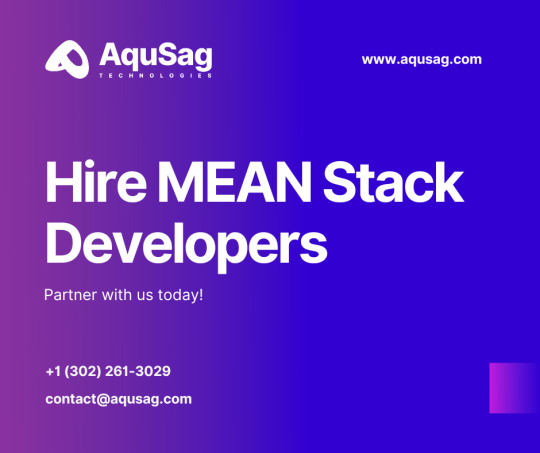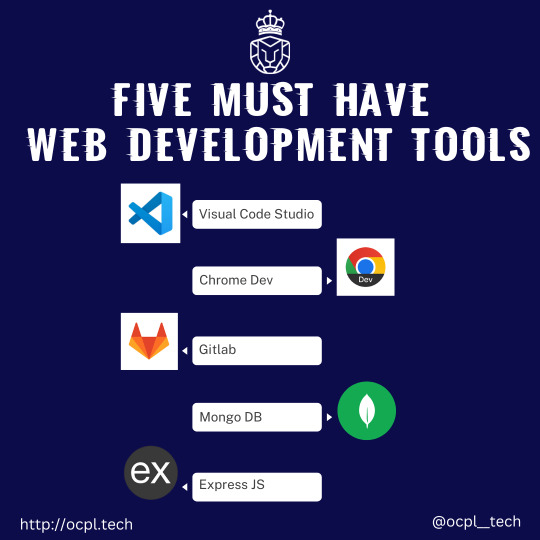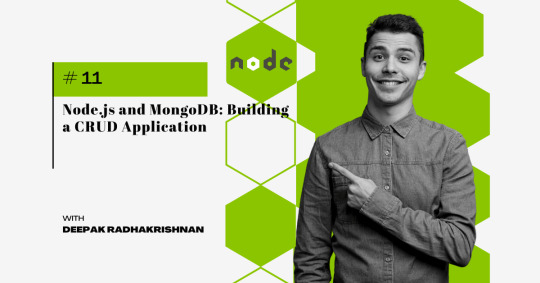#MongoDB web development
Explore tagged Tumblr posts
Text
Available Skilled MEAN Stack Developers for hire

Skilled and experienced MEAN Stack Developers available for immediate hire. Aqusag offers an expert full-stack JavaScript development team ready to create custom web applications. Find skilled MongoDB, Express.js, Angular, and Node.js experts for your projects. Hire our experienced MEAN stack developers who are committed to deliver ultimate business solutions. Our team understands the importance of the client’s requirements and time. We actively work to achieve milestones and complete your project on time.
For more information visit : https://aqusag.com/hire-mean-stack-developers
#hire mean stack developers#expert mean stack development#skilled full-stack javascript#MEAN stack web application development#mongodb express js angular
11 notes
·
View notes
Text

Kickstart your career in full stack web development with the best MERN Stack course in Indore offered by MindCoders. This industry-focused program covers MongoDB, Express.js, React.js, and Node.js with hands-on projects, real-time code implementation, and expert guidance. Whether you're a beginner or looking to upskill, MindCoders ensures job-ready skills with personalized mentorship and career support.
#MERN Stack#Full Stack Web Development#MongoDB#Express.js#React.js#Node.js#Best MERN Stack Course in Indore#MindCoders#Web Developer Course#Coding Institute in Indore#Project-based Learning
0 notes
Text

Looking to build websites that do more than just look good? The MERN Stack Development Course at MindCoders is designed to help you learn how to create full-fledged web applications—from frontend to backend. You'll get hands-on with MongoDB, Express, React, and Node.js, the same technologies used by top tech companies. Whether you're just starting out or want to sharpen your skills, this course walks you through real projects, guided by mentors who know the field inside out. It’s not just about learning to code—it’s about building things that work.
#MERN Stack Development Course#Full Stack Developer Course#MERN Stack Course in Indore#Learn MERN Stack#MongoDB Express React Node Course#Full Stack Web Development#MindCoders MERN Stack#MERN Stack Training Institute#Web Development Course with Placement
0 notes
Text
India’s Best Student Learning Platform for Tech Skills
My Growth Crafter is a dedicated student learning platform offering curated content, interactive courses, and career-oriented mentorship. Join a community focused on future-ready skills and hands-on learning.

#MERN full-stack development workshop#learn full-stack web development#MongoDB Express React Node training#front-end and back-end coding#JavaScript development course
0 notes
Text
#restapi#reactjs#backenddevelopment#server connectivity#web development#full stack developer#node.js#expressjs#mongodb atlas
0 notes
Text
The Web Developer Bootcamp 2025 - Free Course
Course Content
Introduction to Web Development
Building Web Pages with HTML5 & CSS3
JavaScript Basics & Advanced Concepts
Back-End Development with Node.js
Database Management with MongoDB
Building Full-Stack Web Applications
Deploying Projects to the Web
Join Now
#Web Development#Full-Stack Development#Udemy Course#Web Developer Bootcamp#Free Web Development Course#Learn HTML & CSS#JavaScript Basics#Node.js#MongoDB#Web Development Training#Free Online Course#Build Web Applications#Back-End Development#Front-End Development#Enroll Now#Programming Course#Beginner Web Development#Web Development Certification#Learn to Code#Web Development Bootcamp 2025#Free Coding Course
0 notes
Text
How to Import JSON into MongoDB Compass.
Como Importar Un JSON a MongoDB Compass.

#software development#web development#100daysofcode#developerlife#web developers#developers#devs#worldcode#developers & startups#backenddevelopment#json#mongodb#database#basededatos
0 notes
Text
#mern stack developer#web services#mongodb#express#Express#React#Node js#Mern stack programmer#framework
0 notes
Text
Ruby on Rails with MongoDB: Power of Non-Relational Databases
Using Ruby on Rails with MongoDB offers significant benefits for scalable web development. This powerful combination enhances both flexibility and performance, making it an ideal choice for developers. Ruby on Rails, known for its simplicity and convention-over-configuration approach, streamlines the development process, while MongoDB, a NoSQL database, provides the flexibility to handle unstructured data and scale effortlessly. Together, they create a robust environment where web applications can grow and adapt to changing demands with ease, delivering a seamless and efficient user experience.

#Ruby on Rails with MongoDB#ruby on rails development#ruby on rails development company#ruby on rails company#ruby on rails development services#offshore ruby on rails development#ruby on rails development agency#ruby on rails development india#ruby on rails development firm#custom ruby on rails development services#ruby on rails development company usa#ruby on rails development company in india#ruby on rails development company india#hire ruby on rails development company#offshore ruby on rails development company#ruby on rails development new york#hire ruby on rails development companies#top ruby on rails development company#ruby on rails development companies in india#rails development companies#rails development company#ruby development company#rails company#rails development#ruby development#ruby on rails development companies#ruby on rails companies#ruby on rails web development#best ruby on rails companies#ruby on rails agency
1 note
·
View note
Text

Web development is the backbone of the digital world, and having the right tools can make all the difference! Here are 5 must-have web development tools that will boost your efficiency and make your work shine.
1 note
·
View note
Text
Hire MERN Stack Developers in New York: Build Scalable, Modern Web Applications

In today’s fast-evolving digital landscape, businesses in New York are seeking powerful, flexible, and scalable web solutions to stay ahead. Whether you're a startup looking to build an MVP or an established enterprise in need of a modern web application, the MERN stack offers the perfect foundation. But how do you ensure the success of your project? It all starts when you hire MERN stack developers in New York who are experienced, resourceful, and aligned with your business goals.
This guide will walk you through everything you need to know — from understanding what MERN stack is, to why it’s a great fit for your project, and how to hire the right development talent locally in New York.
What is the MERN Stack?
MERN is an acronym for a popular JavaScript tech stack used for building dynamic full-stack web applications:
MongoDB – A NoSQL database for storing data in JSON-like documents.
Express.js – A lightweight Node.js web framework for handling HTTP requests.
React.js – A front-end JavaScript library for building user interfaces.
Node.js – A JavaScript runtime that executes server-side code.
All four technologies use JavaScript, enabling developers to build both client-side and server-side logic using a single language, which speeds up development and improves maintainability.
Why Choose MERN Stack for Your Next Project?
Hiring MERN stack developers gives you access to a powerful ecosystem ideal for:
Single Page Applications (SPAs)
Progressive Web Apps (PWAs)
Real-time Collaboration Tools
Dashboards & Data Visualization Tools
E-commerce Platforms
Custom CRM and ERP Systems
The seamless integration between the front-end and back-end layers reduces development time and ensures a consistent coding approach.
Top Business Benefits of MERN Stack Development
Fast Development Cycle JavaScript across all layers minimizes context switching, enabling faster iterations and deployments.
Scalability MERN applications scale well, both horizontally and vertically. Perfect for startups and growing enterprises.
High Performance Node.js supports asynchronous processing, delivering fast server-side responses, while React’s virtual DOM boosts UI performance.
Flexibility MERN enables the development of highly customizable applications tailored to your business processes.
Community Support With thousands of developers actively contributing to each technology, continuous support and updates are guaranteed.
Why New York is a Prime Location for Hiring MERN Developers
As a global tech hub, New York boasts a vibrant developer community, innovation-driven businesses, and an ecosystem that supports digital transformation. Here’s why hiring MERN stack developers in New York is a smart decision:
Access to a Large Talent Pool: New York is home to top-tier development talent with diverse industry experience across healthcare, finance, logistics, and AI/ML.
Tech-Savvy Workforce: Developers here are not just coders but problem solvers familiar with business logic and emerging technologies.
Proximity to Clients: Hiring locally ensures better communication, cultural alignment, and face-to-face collaboration when needed.
Compliance & Legal Transparency: Working with developers within the U.S. ensures adherence to federal data protection and IP laws.
How to Hire MERN Stack Developers in New York
The hiring process should be strategic, especially when looking for developers who can align with your business vision. Here’s a step-by-step process:
Define Your Project Requirements: List features, technology needs, deadlines, and expected outcomes.
Choose the Hiring Model: Decide whether you need a freelancer, a full-time developer, or a dedicated team.
Source Candidates: Use professional networks, job boards, or specialized tech platforms to find developers.
Evaluate Technical Skills: Conduct coding tests, system design interviews, and project walkthroughs.
Check Portfolio & References: Evaluate past work and get feedback from previous clients.
Finalize Contracts: Ensure NDA, IP protection clauses, and payment terms are clearly defined.
Skills to Look for in a MERN Stack Developer
When hiring, look for a well-rounded skill set that goes beyond just coding. Essential skills include:
Technical Skills:
Proficiency in JavaScript, ES6+
Experience with MongoDB, Express.js, React.js, Node.js
RESTful API development
Familiarity with cloud platforms (AWS, Azure, etc.)
Git version control
Test-driven development (TDD)
Deployment and CI/CD pipelines
Soft Skills:
Strong problem-solving abilities
Clear communication
Agile and Scrum methodology experience
Team collaboration
Cost of Hiring MERN Stack Developers in New York
The cost can vary depending on experience, project complexity, and hiring model:
Freelancers: $50–$100/hour
Mid-Level Developers (Full-time): $90,000–$120,000/year
Senior Developers or Team Leads: $130,000–$160,000/year
Dedicated Development Teams: $6,000–$15,000/month depending on scope
Hiring in New York is an investment — but the ROI from quality local developers with strong business understanding and timely delivery is often well worth it.
Hiring Models: Freelancers, In-House, or Outsourced Teams?
Freelancers:
Pros: Cost-effective for small tasks or MVPs.
Cons: Limited availability, lack of long-term commitment.
In-House Developers:
Pros: Full-time focus, cultural alignment.
Cons: Higher cost, longer hiring cycles.
Outsourced Development Teams:
Pros: Scalable, fast onboarding, often more affordable.
Cons: Potential time zone and communication challenges (unless local).
For businesses in New York, a local outsourced team combines the best of both worlds — cost efficiency and location alignment.
Common Use Cases for MERN Stack Applications
Businesses across industries are leveraging MERN stack for:
Healthcare platforms with secure patient data access
Fintech dashboards with real-time data
Logistics apps with real-time tracking and analytics
AI/ML-powered analytics tools
eCommerce websites with dynamic user experiences
SaaS products tailored for B2B and B2C
These applications benefit from MERN's dynamic rendering, real-time processing, and responsive design capabilities.
Future-Proofing Your Business with MERN Stack Talent
Hiring MERN stack developers in New York isn’t just about immediate development needs. It’s about building a foundation for continuous innovation. With digital transformation accelerating, having a full-stack team skilled in modern technologies ensures:
Faster time to market
Seamless integration with cloud and AI tools
Strong data architecture for analytics
Agile, scalable solutions ready for future business needs
Final Thoughts
To stay competitive, businesses need technology partners who understand not just code but also strategy. When you hire MERN stack developers in New York, you gain access to world-class development expertise coupled with local market insight.
Whether you're launching a new product, modernizing legacy systems, or scaling your operations, MERN developers bring the right mix of speed, agility, and innovation to make it happen.
See more service:
Offshore Development Cost Calculator
Hire MERN Stack Developers in New York
Hire ReactJS Developers in New York
Hire Full Stack Developers in New York
#MERN stack developers#New York City#web applications#MERN stack#MongoDB#Express.js#React#Node.js#AquSag Technologies#full stack developer skills#software development
0 notes
Text
Node.js and MongoDB: Building a CRUD Application
Learn how to build a CRUD application with Node.js and MongoDB. This comprehensive guide covers setting up a server, connecting to a database, implementing CRUD operations, and more.
Introduction Node.js and MongoDB form a powerful combination for building modern web applications. MongoDB, a NoSQL database, provides flexibility in storing and managing data, while Node.js offers an efficient runtime for building scalable server-side applications. In this guide, we’ll build a practical CRUD (Create, Read, Update, Delete) application—a simple Task Manager—using Node.js and…

View On WordPress
#API development#CRUD application#database integration#Express.js#JavaScript#MongoDB#Node.js#web development
0 notes
Text

Become a Full Stack Developer with the MERN Stack Course by MindCoders – Indore’s Leading Tech Institute
Kickstart your career in web development with MindCoders’ advanced MERN Stack Development Course in Indore. This hands-on program covers MongoDB, Express.js, React.js, and Node.js, equipping you with the skills to build dynamic, full-stack web applications from scratch. Learn from industry experts, work on real-world projects, and gain job-ready experience in frontend and backend technologies. Whether you're a beginner or looking to upskill, this course is perfect for aspiring developers aiming to thrive in the tech industry.
Join MindCoders in Indore and become a certified MERN Stack Developer ready for global opportunities.
#MERN Stack Development#MERN Stack Course#Full Stack Development#Web Development Course#Learn MERN Stack#MongoDB Express React Node#Full Stack Developer Training#MERN Stack Training#Coding Bootcamp#Web App Development#JavaScript Developer Course#Full Stack JavaScript#MindCoders MERN Course#MERN Stack Projects#Software Development Course
0 notes
Text
MongoDB Advantages and Disadvantages
MongoDB, a leading NoSQL database, is renowned for its versatility and robust performance in handling diverse data storage needs. Unlike traditional relational databases, MongoDB uses a document-oriented approach, storing data in flexible, JSON-like documents. This modern architecture offers a range of advantages that cater to the dynamic requirements of contemporary applications, making it a popular choice among developers and enterprises alike. From scalability and high availability to developer productivity and cloud integration, MongoDB provides a comprehensive solution for efficient data management in various environments.
0 notes
Text
I'm building a eCommerce in MERN-stack right now for my master thesis.
I need help with javascript. It feels so lonely sometimes, so if there is anybody out there who wanna review my code or just be my javascript code buddy hit me up.
I would be really happy for just a little help or just to be able to discuss stuff with somebody who also feels lonely in coding. Maybe i can help back someday. 🩷
#javascript#mernstack#ecommerce#webshop#web developer#website#web design#web development#react#mongodb#nodejs#expressjs
1 note
·
View note
Text
If you are looking for web development tutorials and projects with source code .
Then do have a read on this article.
#web development#website#web design#html5#css3#javascript#full stack developer#web developers#drawing apps#calculator app#website design#weather app#todo list#quiz app#login and sign up form#digital clock#analog clock#countdown timer#reactjs#nodejs#mongodb#expressjs#code editor
1 note
·
View note